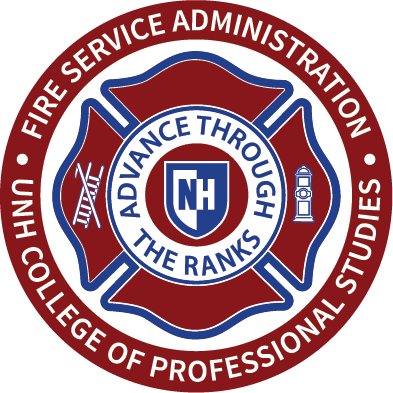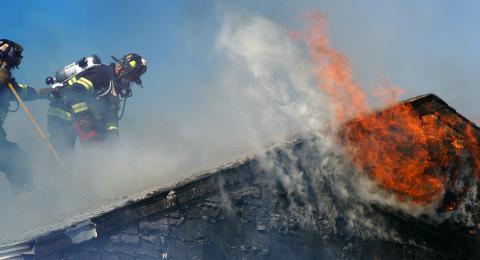Our online B.S. in Fire Service Administration is designed to prepare students to lead progressive agencies into the future by focusing on academically challenging, authentic learning experiences addressing a wide breadth of contemporary industry topics. This bachelor's completion program requires an earned associate degree from a regionally accredited college in Fire Science or a related field and certification as an NFPA 1001 Firefighter II from a ProBoard- or IFSAC-accredited agency.
Credit Hours: 120 | Transfer: Up to 90 Credits | Tuition Cost
Advance through the Ranks in the Fire Service

Fire service is experiencing unprecedented growth. Across the country, emergency call volume is steadily increasing. At the same time, other essential duties related to community risk reduction and public health issues, such as the opioid epidemic and pandemic response, are being addressed using fire service resources. As agencies respond in support of these increasingly complex challenges, there is a strong need to have well-prepared and educated personnel within the leadership pipeline to fulfill supervisory- and executive-level administrative roles.
As an emerging leader, earning a bachelor’s degree is an excellent way to build a foundation to advance through the ranks of company and chief officer or serve in prevention functions in the public or private fire service. Our B.S. in Fire Service Administration is designed to prepare students to lead progressive agencies into the future by focusing on academically challenging, authentic learning experiences addressing a wide breadth of contemporary industry topics.
Bachelor's Completion
This program requires an associate degree in fire science or a related field from a regionally accredited college and certification as an NFPA 1001 Firefighter II from a ProBoard—or IFSAC-accredited agency.
Course Highlights
- Fire Service Ethics
- Community Risk Reduction for the Fire and Emergency Services
- Political and Legal Foundations for Fire Protection
- Fire Prevention Organization and Management
- Personnel Management for the Fire Service
- Applications of Fire Research
- Fire and Emergency Services Administration
...and more!
Leadership: Make an Impact
The UNH College of Professional Studies takes a unique approach by focusing on individual leadership. It teaches students how to lead teams, communicate effectively, cultivate vision, and be agile decision-makers in any industry.
Why UNH CPS?
The Bachelor of Science in Fire Service Administration degree prepares fire service professionals with the leadership, management, and administrative knowledge and skills essential to advance in the fire service field. The program integrates knowledge and skills necessary to mitigate the ethical, moral, social, and situational challenges of fire and emergency services.
- Regionally accredited by the New England Commission on Higher Education, Inc. (NECHE).
- Available fully online with select on-campus courses.
- Affordable tuition.
- Nationally ranked online programs.
- About 89% of our students are transfer students. Making the most of your transfer credits is our specialty.
- Career advising is available to all students and alumni. We also extend this service to those considering their college options.
- Faculty who are subject matter experts and share their real-world expertise, helping you apply what you learn to your personal goals and career.
- We’re experts at assessing credit toward your undergraduate degree – not only from previous college coursework, but also for other college-level knowledge demonstrated outside the traditional classroom.
Whether you completed your associate degree or took a few courses, we have experience working with community college students nationwide and we are experts at maximizing your transfer credits. We are proud of our formal partnerships to support community college graduates through our Transfer Pathways.
Students pursuing an associate degree at a New Hampshire community college are encouraged to explore our Transfer Pathway below.
mount wachusett community college Transfer Pathway
Lakes region community college Transfer Pathway
- Completion of our free, online application for admission
- High school diploma, completion of a high school education in a homeschool setting under state law, or demonstrate high school equivalency.
- Successful completion of one of the following exams will be required for demonstrating high school equivalency: the GED, HiSET, or TASC
- Associate degree in Fire Science or a related field
- Certification as an NFPA 1001 Firefighter II issued by a Pro Board- or IFSAC-accredited agency
Get started by connecting with an advisor.
An advisor trained in our fire service administration program will contact you to learn more about your academic and career goals.
New for 2024!
Ask about our Community College Partnership Discount for Fire Service Grads from Lakes Region Community College and Mount Wachusett Community College!
View the Transfer Pathway section above for details.
Curriculum & Requirements
This degree plan is a sample and does not reflect the impact of transfer credit or current course offerings. UNH CPS Online undergraduate students should develop individual academic plans with their academic advisor during their first year at UNH.
Sample Course Sequence - For students with conferred associate degree
| First Year | ||
|---|---|---|
| Fall | Credits | |
| FSA 603 | Principles of Emergency Services | 4 |
| COM 590 | Professional Communication | 4 |
| FSA 605 | Fire Service Ethics | 4 |
| FSA 610 | Community Risk Reduction for the Fire and Emergency Services | 4 |
| Credits | 16 | |
| Spring | ||
| FSA 635 | Political and Legal Foundations for Fire Protection | 4 |
| FSA 665 or BEHS 665 | Command and Control of Large-Scale Incidents or Disaster Management | 4 |
| CRIT 602 | Advanced Critical Analysis and Strategic Thinking | 4 |
| FSA 710 | Personnel Management for the Fire Service | 4 |
| Credits | 16 | |
| Second Year | ||
| Fall | ||
| FSA 685 | Fire Prevention Organization and Management | 4 |
| FSA 760 | Fire and Emergency Services Administration | 4 |
| MTH 504 | Statistics | 4 |
| Credits | 12 | |
| Spring | ||
| IDIS 601 | 4 | |
| FSA 740 | Applications of Fire Research | 4 |
| Credits | 8 | |
| Third Year | ||
| Fall | ||
| COM 665 or COM 710 | Media and Strategic Communication or Managerial Communication | 4 |
| FSA 797 | Integrative Capstone: Research Project in Fire Service Administration | 4 |
| Credits | 8 | |
| Total Credits | 60 | |
Degree Requirements
General Education Program Requirements
A minimum grade of D- is required in all General Education coursework. Students are allowed a maximum of two course overlaps. Overlaps can be used between Major, Minor and General Education requirements with only 8 credits overlapped between the Major and Minor.
All General Education requirements must be taken prior to the capstone.
| Code | Title | Credits |
|---|---|---|
| ENG 420 | The Writing Process | 4 |
| COM 460 | Interpersonal Communication and Group Dynamics | 4 |
| COM 480 | Visual Communication | 4 |
| CRIT 501 | Introduction to Critical Inquiry | 4 |
| Select one of the following: | 4 | |
MTH 402 | Math for Our World | |
MTH 504 | Statistics | |
MTH 510 | Pre-Calculus | |
| Knowledge of Human Behavior & Social Systems | 4 | |
| Knowledge of the Physical & Natural World | 4 | |
| Knowledge of Human Thought & Expression | 4 | |
| CRIT 602 | Advanced Critical Analysis and Strategic Thinking | 4 |
| IDIS 601A | Interdisciplinary Seminar: Being Happy | 4 |
| or IDIS 601B | Interdisciplinary Seminar: Business of Beer | |
| or IDIS 601C | Interdisciplinary Seminar: Paranormal Activities | |
| Total Credits | 40 | |
Writing Program Requirements
All bachelor's degree candidates are required to complete four writing intensive courses as part of the University Writing Program Requirements as follows:
| Code | Title | Credits |
|---|---|---|
ENG 420 | The Writing Process | |
One Writing Intensive course in the Major | ||
One Writing Intensive course at the 600-level or above | ||
One Additional Writing Intensive Course | ||
Writing Intensive courses are identified with the label "Writing Intensive Course" in the "Attributes" section of the course description and/or a W following the course number.
Major Requirements
Prerequisite: Must have completed an Associate Degree or equivalent in Fire Science field.
Prior to capstone enrollment, students are expected to complete the majority of their required major courses along with CRIT 602 Advanced Critical Analysis and Strategic Thinking and IDIS 601 Interdisciplinary Seminar. Students should consult with their advisor regarding specific major courses that may be completed with their capstone. Academic Advisor approval is required for registration to be processed.
| Code | Title | Credits |
|---|---|---|
| Major in Fire Service Administration | ||
| Intermediate Courses | ||
| FSA 603 | Principles of Emergency Services | 4 |
| COM 590 | Professional Communication | 4 |
| COM 665 | Media and Strategic Communication | 4 |
| or COM 710 | Managerial Communication | |
| FSA 605 | Fire Service Ethics | 4 |
| FSA 610 | Community Risk Reduction for the Fire and Emergency Services | 4 |
| FSA 635 | Political and Legal Foundations for Fire Protection | 4 |
| MTH 504 | Statistics | 4 |
| FSA 665 | Command and Control of Large-Scale Incidents | 4 |
| or BEHS 665 | Disaster Management | |
| Advanced Courses | ||
| FSA 685 | Fire Prevention Organization and Management | 4 |
| FSA 710 | Personnel Management for the Fire Service | 4 |
| FSA 740 | Applications of Fire Research | 4 |
| FSA 760 | Fire and Emergency Services Administration | 4 |
| Integrative Capstone | ||
| FSA 797 | Integrative Capstone: Research Project in Fire Service Administration | 4 |
| Total Credits | 52 | |
Electives
Open electives are courses students will need to take in addition to their general education and major requirements in order to satisfy the remaining credit totals for their programs. Open electives are defined as any credit course offered by the College not already included in the student's general education, major, option or minor. Students will need 120 credits total to graduate with a bachelor's degree from the Online Division of the College of Professional Studies.
Program Learning Outcomes
- Demonstrate leadership skills and utilize administrative techniques related to the organizational management of fire and emergency services.
- Integrate research, critical thinking, and analytical decision-making skills to address challenges faced in the delivery and execution of modern fire and emergency services.
- Apply principles of ethics to evaluate fire and emergency services moral and social issues and make principle-based decisions.
- Identify and prioritize public safety threats and hazards and develop fire and emergency service community risk reduction plans.
- Conduct dynamic situational assessments and apply knowledge of risk reduction to develop strategic incident action plans that are consistent with professional standards and best practices to mitigate emergencies or disasters in the community.
Career Outcomes
Talk with your advisor to discuss how your program, experience, and goals align.
